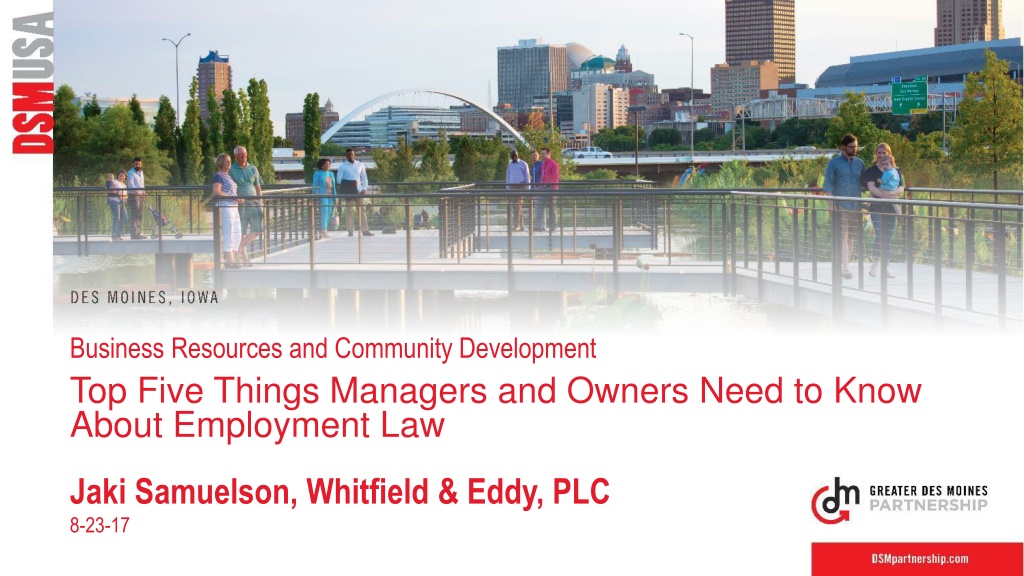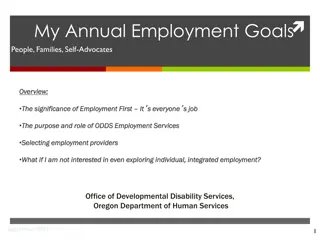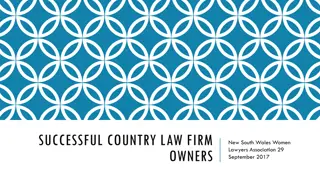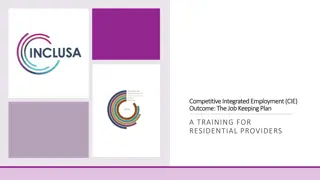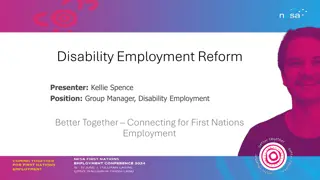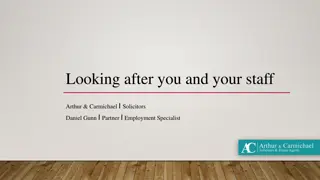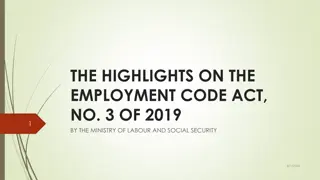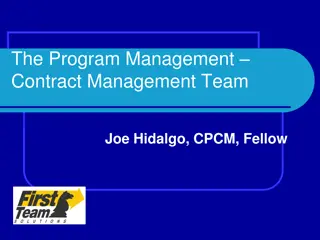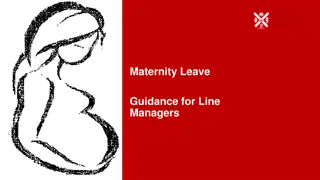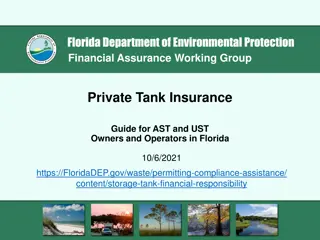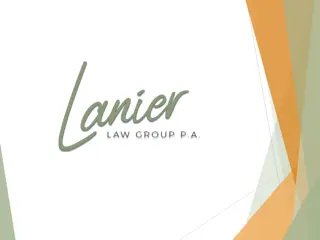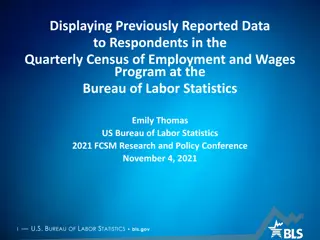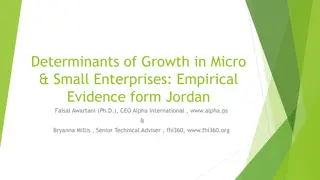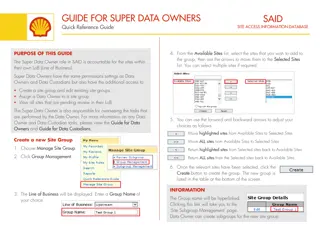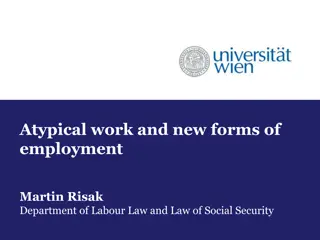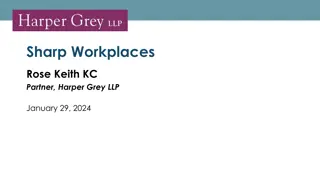Understanding Key Aspects of Employment Law for Managers and Owners
This presentation covers essential information on employment law that managers and owners need to know. It includes an overview of statutes, regulations, and legal rules, as well as details on federal laws such as Title VII, ADEA, ADA/ADAAA, state and municipal laws like ICRA, and USERRA. The content emphasizes the importance of preventing discrimination and harassment in the workplace to comply with legal requirements.
Download Presentation

Please find below an Image/Link to download the presentation.
The content on the website is provided AS IS for your information and personal use only. It may not be sold, licensed, or shared on other websites without obtaining consent from the author. Download presentation by click this link. If you encounter any issues during the download, it is possible that the publisher has removed the file from their server.
E N D
Presentation Transcript
Business Resources and Community Development Top Five Things Managers and Owners Need to Know About Employment Law Jaki Samuelson, Whitfield & Eddy, PLC 8-23-17
AGENDA #1 Know Your ABCs #2 An Ounce of Prevention Saves Pounds of Time and Money #3 Heed the Squeaky Wheel #4 Don t be Caught Napping If You Snooze, You Lose #5 We Live in Uncertain Times
#1: KNOW YOUR ABCs Overview of the statutes, regulations and legal rules employers need to know and follow.
EMPLOYMENT DISCRIMINATION Federal Laws 1. Title VII Prohibits discrimination and harassment based on race, color, religion, national origin, gender, pregnancy; Prohibits sexual harassment by supervisors and co-employees. 1. Quid Pro Quo 2. Hostile work environment; Prohibits retaliation; Affirmative defenses under some circumstances when employer has an antidiscrimination policy, grievance procedure and follows it.
2. ADEA: Age Discrimination in Employment Act prohibits discrimination and harassment against employees or applicants over age 40 and retaliation. 3. ADA/ADAAA: Americans with Disabilities Act and Americans with Disability Act Amendments Act : Prohibits discrimination and harassment against employees and applicants based on physical or mental disability or a perception of disability. Requires reasonable accommodations. Prohibits certain requests for medical information.
State and Municipal Laws 1. ICRA: Iowa Civil Rights Act and other similar state laws 2. Certain City Ordinances Provide similar coverage to Title VII, ADEA, ADA, PLUS ICRA and some cities also prohibit discrimination and harassment based on sexual orientation and gender identity.
USERRA Uniformed Services Employment and Reemployment Rights Act provides military service leave; prohibits discrimination against service members and provides job protection after return from service.
FMLA: Family and Medical Leave Act Applies to employers with >50 employees in a 75 mile radius. Applies to employees who have worked 1,250 hours in the past month.
Provides leave of up to 12 weeks in connection with: The employee s serious medical condition; The employee s need to care for a child, spouse or parent with a serious medical condition; or Birth or adoption of a child (both maternity and paternity). Provides leave for family members of members of the military for caregiving and taking care of exigencies.
ICRA: MEDICAL/MATERNITY LEAVE FOR SMALLER EMPLOYERS Iowa law requires a minimum of 8 weeks for disability related to pregnancy/childbirth. Medical leave is up to the company s policy.
NLRA: National Labor Relations Act Applies to non-union as well as union employers. Follow your CBA; be aware of, seek help as needed with organizing efforts. Cannot prohibit employees from communicating about compensation, working conditions (social media issues).
FLSA: Fair Labor Standards Act Regulates minimum wages and maximum hours. Requires payment for overtime (more than 40 hours per week) at the rate of 1 times regular wages for employees (non-exempt) other than those in professional, supervisory, administrative and certain sales and computer related (exempt) positions. Comp time is allowed only if taken during the same week.
WARN: Worker Adjustment and Retraining Notification Act (Federal and State) Requires Advance Notice of layoffs affecting more than 25 employees (State) or 50 employees (Federal). Does not apply to employees hired for jobs of specific duration.
Workers Compensation (Iowa Code Chapter 85) Employee claims for medical and lost wage benefits caused by injuries at the workplace. Unemployment Compensation (Iowa Code Chapter 96) Employee claims for benefits after termination of employment. Can be drawn during layoffs.
Wage Payment Collection Act (Iowa Code Chapter 91A) Addresses payment of wages, commissions and benefits for current and terminated employees. Restricts reductions from wages. Must have written authorization from employees for allowed types of deductions.
COBRA and Iowa Code 509B Requires continuation of health insurance. ERISA: Employee Retirement Income Security Act Protects employees rights to pension and other employee benefits.
Affordable Care Act (ACA, Obamacare) Contains benefits and responsibilities for employers depending on the size and structure of the employer s workforce.
HOMELAND SECURITY ACT Form I-9 and mandatory identification.
OSHA/IOSHA Provides standard for workplace safety. Prohibits retaliation against employees who report violations.
DRUG AND ALCOHOL TESTING Iowa Code 730.5 can be required only if the company has a policy that conforms to Iowa law and in conformance with the policy. DOT rules for CDL drivers; 49 CFR Part 40 http://www.fmcsa.dot.gov/regulations/drug-alcohol- testing/overview-drug-and-alcohol-rules
Black Listing (Iowa Code Section 730.1, .2) Prohibits employers from preventing or attempting to prevent an employee discharged by employer from obtaining other employment, except by furnishing, in writing on request a truthful statement as to the cause of the person s discharge.
Serious misdemeanor. Liability for damages and treble damages.
EMPLOYEE REFERENCE PROTECTION (IOWA CODE 91B.2) Employers are immune from liability when, in response to (1) an authorization or request by employee OR (2) a request from a prospective employer, they provide work-related information, unless they act unreasonably.
Unreasonable acts include violating civil rights; the employer knows the person requesting information doesn t have a work-related purpose; the information is not responsive; or the employer does not have a good faith belief that it is true.
Personnel Files Iowa Code 91B Requires employers to provide employees access to personnel files.
UNIFORM TRADE SECRETS ACT Prohibits employees from misappropriating employer s proprietary information. Employer must take reasonable steps to maintain confidentiality.
LAWS VARY FROM STATE TO STATE Breaks/Meal Periods Final Paychecks Drug/Alcohol Testing Jury Duty/Compensation Minimum Wage Non-Duty Conduct Payment of Unused Leave Upon Termination Pregnancy Leave Polygraph Testing References Wage Deductions/Payment
TORT CLAIMS Wrongful Termination At will employment is the rule in Iowa. Exceptions: public policy violation and whistleblowing.
DEFAMATION Making derogatory statements about an employee or former employee, particularly (but not limited to) statements relating to the employee s honesty or integrity.
INVASION OF PRIVACY Workplace searches Attempts to regulate off duty conduct Social media!
CONTRACT CLAIMS Written Employment Contracts; CBAs. Handbooks are generally not construed to be contracts. Oral promises are rarely contracts.
#2: AN OUNCE OF PREVENTION SAVES POUNDS OF TIME AND MONEY Best practices to avoid employee complaints and claims.
ADVERTISING / APPLICATION PROCESS Use standard advertisements and application forms. Include a statement concerning at will employment and a release to contact prior employers and references. It s fine to invite applications by individuals you believe may be well qualified for positions, but be sure that their qualifications are fairly compared to other applicants no favoritism. Keep copies of applications for one (1) year (required by EEOC).
HIRING PROCESS Interviews Attempt to ask uniform questions of all applicants. Do not ask any questions pertaining to race, sex (i.e., pregnancy, child care arrangements, etc.), religion, natural origin, age or disability.
You may describe the job to the interviewee and ask if the person would be capable of performing the full range of job duties and, if assistance or accommodation would be required for them to do so, what type of accommodation they would require. (If the person indicates a need for accommodation you may not exclude them from consideration for employment solely on that basis.)
SELECTION PROCESS Use job descriptions to evaluate applicants relevant qualifications. Be sure to select the person who best meets the qualifications and that you can explain why the person chosen has superior qualifications.
DISCIPLINE Consistency Confidentiality
DOCUMENTATION If an employee is orally counseled about a problem, make a note of the counseling and put it in the file. If the problem is serious or repetitive, give the employee a written counseling document that describes the problem, what must be done to remedy it, and what the consequences will be if the problem is not remedied or recurs; the employee should be asked to sign this document. All documentation should be prepared at the time of the problem and the disciplinary action. Be sure copies of all documentation are sent in for inclusion in the personnel file.
EMPLOYEE PERFORMANCE Should be regularly evaluated either formally, by way of a formal evaluation checklist, or informally in discussions with supervisor or manager. Consistency Documentation Confidentiality
TERMINATIONS Consistency. Be sure that reasons leading up to termination are documented in the personnel file. Have more than one person present when termination is carried out. Ensure all wages are properly and timely paid.
REFERENCE CHECKS Limit information that is disclosed to job title/duties, years of employment, salary at time employment ended.
#3: HEED THE SQUEAKY WHEEL Learning from and dealing with internal complaints and issues.
WHEN TO INVESTIGATE Always when there is a complaint of discrimination or harassment. When management observes or is informed of issues that may violate a law, regulation or policy. When management observes or is informed of issues that are disrupting the workplace.
A complaint and investigation procedure can provide the employer an affirmative defense to claims of discrimination or harassment.
CO-EMPLOYEE HARRASSMENT In the case of alleged harassment by a co-worker, the employer is legally responsible only if it has acted negligently. See e.g. Engel v. Rapid City School District, 506 F.3d 1118 (8th Cir. 2007). An employer cannot be vicariously liable for co-worker harassment. See id. The complainant must demonstrate that the employer knew or should have known of the harassment and failed to take appropriate remediate action. See id.
